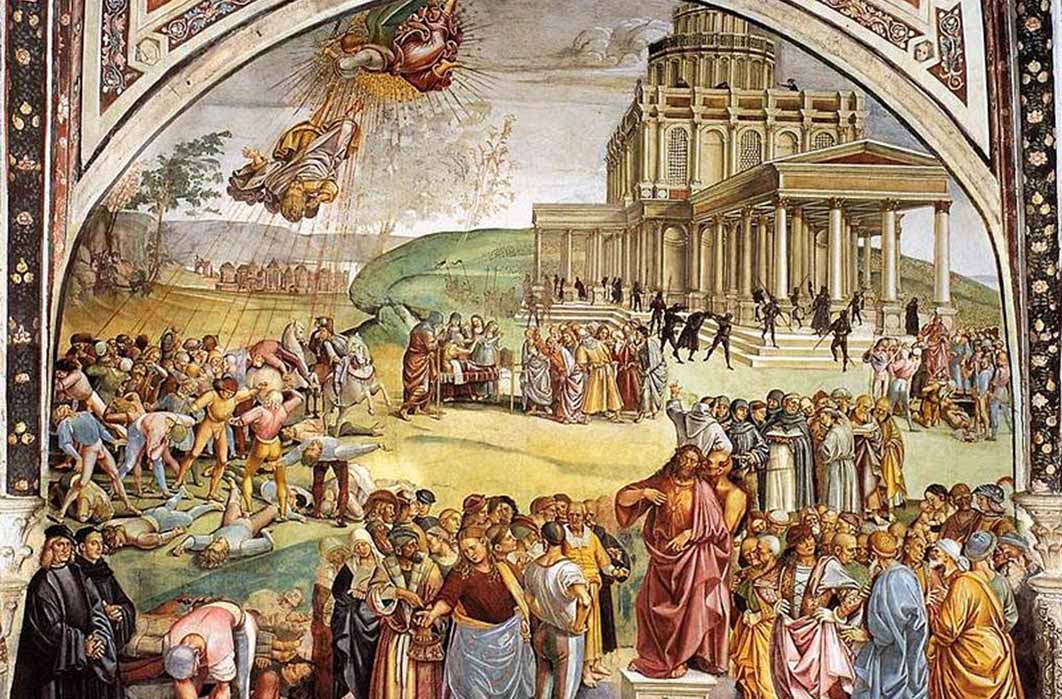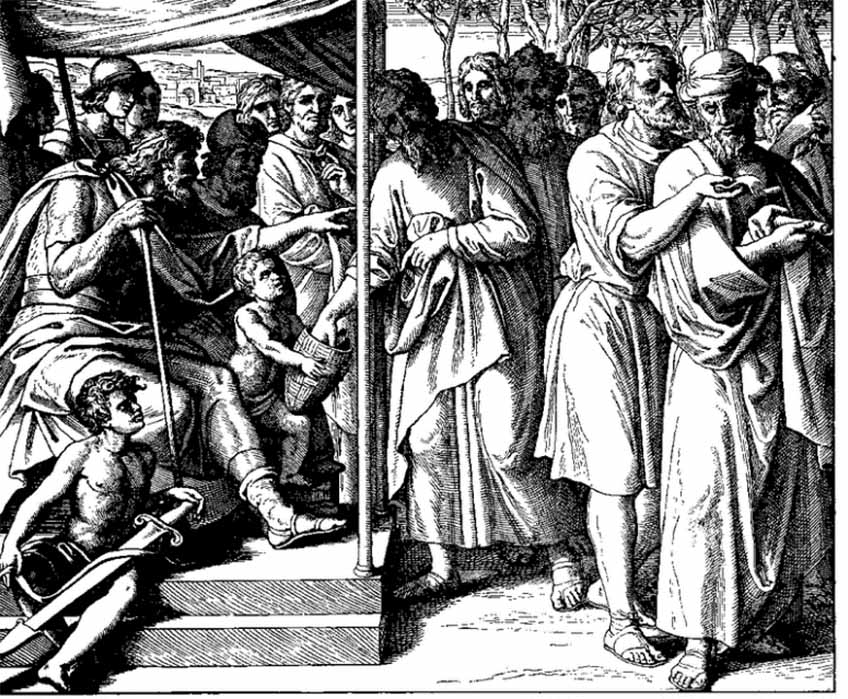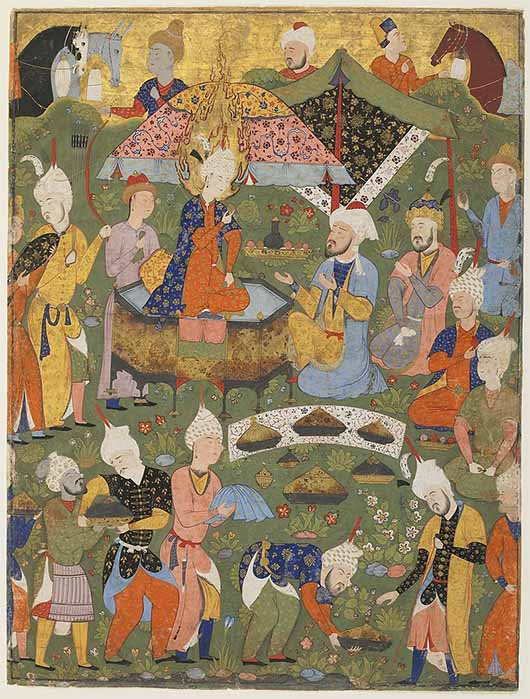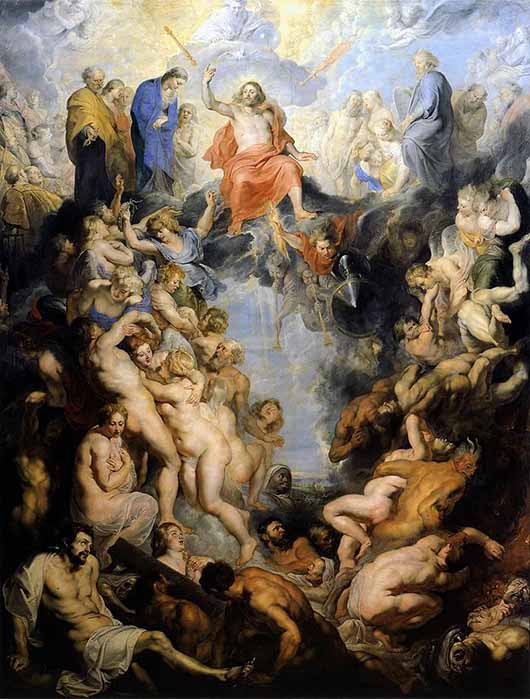
Prophets For Profit: Telling The Future - Fiction, Fact Or Funny
Technically speaking, a prophet is one who is believed to speak for God, but generally speaking, when people hear the word ‘prophet’, they tend to think of one who sees the future. In popular parlance, ‘prophesying’ or ‘telling the future’ is the same thing. People have done this, seemingly, forever, using all kinds of methods, from looking at the pattern of birds in flight; throwing the bones, dice or sticks or reading cards or palms, to predict the future.

Casting lots for tribal inheritance, woodcut for ‘Die Bibel in Bildern’, by Julius Schnorr von Carolsfeld (1860) (Public Domain)
In aeromancy, one seeks the future by looking upward toward the skies. Weather forecasters do this all the time, of course, but the craft also include watching the patterns of birds and butterflies. Sometimes people ‘draw straws’ and this is called belomancy. Randomly opening the Bible, or any book, for that matter, hoping for a message found in the first words read, is called the practice of bibliomancy. Prophets used to carve symbols on small bones, cast them on the ground, and determine the future by their positions, called astragalomancy. Using a special decks of cards to seek messages, is called cartomancy. The phrase, “It is in the cards,” comes from this practice. Palmistry is the art of telling the future by reading creases on the open hand. Casting lots means to throw, or cast, objects such as dice or marked sticks, to see how they land. If dice is used, it is called cubomancy. This is probably what the Jewish prophets did when, in Old Testament times, they utilized the “urim and thummin” to determine God’s will in a particular situation. A conjuror consults the spirits of the dead to foresee the future. A necromancer actually divines the future by reading dead bodies. Sometimes people follow advice given to them in dreams, called oneiromancy. Dowsing, with pendulums, forked sticks, or “L” rods, is technically known as rhabdomancy.

Joseph Enthroned from the "Book of Omens" (Fa'lnama). The reader would flip randomly to a place in the book and digest the text having first viewed the image. (1550, Safavid Dynasty) (Public Domain)
Theomancy: Oracle Of God
Finally, there is Theomancy. This is when an oracle, speaking for God, declares a message from a deity that foretells what “must come to pass.” Usually, the message is a bit complicated, and if the future does not unfold quite the way it was supposed to, the fault lies in the interpretation, not the prophet. Here is a prophecy on the Last Judgement illustrating Theomancy from the Hebrew Scriptures, the Christian Old Testament: “See, the day of the Lord is coming—a cruel day, with wrath and fierce anger—to make the land desolate and destroy the sinners within it. The stars of heaven and their constellations will not show their light. The rising sun will be darkened and the moon will not give its light. I will punish the world for its evil, the wicked for their sins. I will put an end to the arrogance of the haughty and will humble the pride of the ruthless. I will make people scarcer than pure gold, more rare than the gold of Ophir. Therefore, I will make the heavens tremble; and the earth will shake from its place at the wrath of the Lord Almighty, in the day of his burning anger”. (Isaiah 13:9-13)

The Great Last Judgement by Peter Paul Rubens (1614-1617) (Public Domain)
And this, from the Apostle Paul, in the New Testament: “But mark this: There will be terrible times in the last days. People will be lovers of themselves, lovers of money, boastful, proud, abusive, disobedient to their parents, ungrateful, unholy, without love, unforgiving, slanderous, without self-control, brutal, not lovers of the good, treacherous, rash, conceited, lovers of pleasure rather than lovers of God—having a form of godliness but denying its power. Have nothing to do with such people. They are the kind who worm their way into homes and gain control over gullible women, who are loaded down with sins and are swayed by all kinds of evil desires, always learning but never able to come to a knowledge of the truth. Just as Jannes and Jambres opposed Moses, so also these teachers oppose the truth. They are men of depraved minds, who, as far as the faith is concerned, are rejected. But they will not get very far because, as in the case of those men, their folly will be clear to everyone.” (II Timothy 3:1-5)





